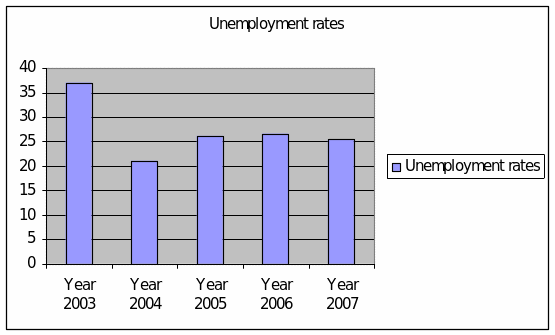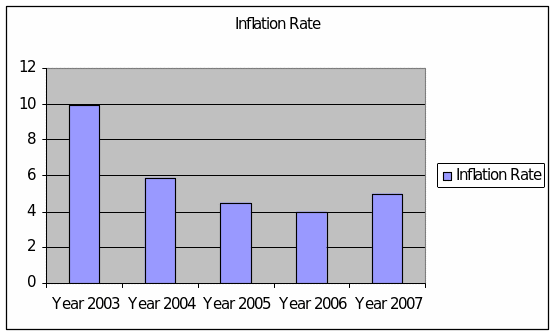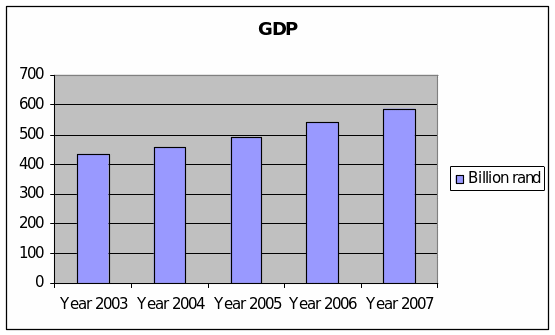Introduction
Our Company, Koffee Grounds has been very successful in the United Kingdom market. The company runs a chain of coffee shops in the UK and has been growing at a rate of 20 % every year for the past five years. Started as a single room coffee shop, the company now owns 50 shops in the country located mainly in London and western UK. Since the growth rate is expected to be maintained for the coming years, further investment is needed and hence a partner was introduced into the company. It has been decided that Koffee Grounds will expand into foreign markets instead of concentrating in the UK alone.
I have a personal interest in expanding to the Republic of South Africa, since my roots belong there. My father had returned to England when I was a child, but regular visits to that country takes place every year. Since I have people who can help us with the venture in South Africa, I had suggested the place to my partner. He insists that a preliminary study be made and a report is prepared before investment.
Report
Value of currency in relation to pound
The currency of South Africa is the rand. The rand stands at 14.92 to one ponds sterling. This could make our products a little expensive if we import our products directly. It would be better to source as many products from the local market as possible. Further study on market availability and costs are needed.
Unemployment
As per April 2007 figures, unemployment stands at 25.5%. But a comparative study with the past five years that the rate is falling though very slowly. Given below is a graph showing unemployment rates from year 2003 to April 2007.

This means that 75% of the population are earning money and may have some surplus to spend on eating out.
Inflation rates
The interest rates in the country stood at a relatively high 11.5%. Getting credit in the country would be relatively expensive. It would be better to raise as much capital in the UK than to borrow funds in South Africa. “Governor Tito Mboweni said the decision to raise the repo rate by half a percentage point to 11,5% was also driven by a deterioration in inflation expectations, which predict the 3%-6% official target range would be breached for three more years.” (Isa, 2008).
Inflation rate had been high at 10% in 2003. But fell drastically to 6% the next year. Rate in 2007 is approximately 5.5%, an increase of 1.5% from the previous year.

Inflation rate is on the high side, but not out of control and much improved when compared to 2003.
Balance of payment
Exports and imports in South Africa almost cancelled itself out. Exports stood at 59.15 billion rand and imports were 61.53 billion rand resulting in a negative balance of payment of only 2.38 billion rand. GDP as of April 2007 was approximately 587 billion rand. It was only 432 billion in 2003.

The economy can be at best called a planned economy. It is still to emerge from the defects of the apartheid era. Disparity in incomes and infrastructure deficiencies still plague the country. But the country has a wealth of natural resources including oil, gold and diamonds. Long term outlook is positive. Though not a vibrant market, investment in South Africa can still be considered. Further study and research is needed before making a commitment.
Note: All figures except for interest rates in South Africa have been sourced from the IndexMundi website. (South Africa. 2007).
Discussion
After analysing the parameters laid out in the initial report on investing South Africa it was decided that further steps should be taken before starting Koffee Grounds in that country. After much effort, a large network of small businessmen in the UK was formed for the purpose of putting pressure on our government to facilitate a better investment climate in South Africa.
Further studies have revealed the following about the economic policies of the country. There still exists protection of the local economy against foreign investment. The current regime is focused more on distribution of existing wealth. The apartheid had created a situation where there existed large disparities in income. The bureaucracy in the country is such that it does not attract real talent. This has resulted in a situation where there is no real symbiotic relationship between the bureaucracy and the private sector in the country.
Even though the country has a Department of Trade and Industry, it does not live up to its role in giving a direction to the private sector in the country. “South Africa does not have an elite, meritocratic bureaucracy that attracts the best talent in the country, the political dispensation leaves little room for the bureaucracy to play a pioneering role, the government’s intervention in market processes occurs more through regulating that through direct participation, there is no leading organisation that is giving direction…..” (Laubscher, 2007). Protection against foreign competition, policies to help exports and stress on import substitution also exists.
The network formed for the purpose of small scale investment in South Africa has been named ‘Association for Creating Small Scale Investment is South Africa’. The group has around 50 members who are at present businessmen having the potential to expand to other countries as a result of their success in home soil. Efforts are being made to increase membership. The informal organization has elected me as president and my partner as honorary treasurer.
A membership fee of 1000 pounds has been collected and funds are earmarked for expenses that may occur in our efforts to influence the government to act on our behalf. Mention should be made that no underhand efforts like bribes will be encouraged by our organization and expensed are mainly earmarked for travelling and other administrative expenses. We have met with various representatives of the foreign trade department UK and have put our views across to them. Our embassy in the Republic of South Africa has been contacted and all help within their capacity has been assured to us.
Special efforts has been made to work in tandem with the Department for International Development (DFID), the UL government’s arm for aiding poor countries for the alleviation of poverty. “We are headed by a Cabinet minister, one of the senior ministers in the Government. This reflects how important the Government sees reducing poverty around the world. We have two headquarters (in London and East Kilbride, near Glasgow) and 64 offices overseas. We also have over 2500 staff, almost half of whom work abroad.” (What We are Doing to Tackle World Poverty? 2008).
Efforts at enlightening the South African Government about opening up their economy for small investors and the resulting employment generation are being planned. Special efforts have been made to make our government understand that it is the small and medium businessmen in any country that can create a positive change in its economy. It is imperative that all support should be given to us at home and for expanding our business overseas.
Bibliography
Isa, Mariam (2008). South Africa: Mboweni Increases Repo Rate to 5-Year High. Business Day. allAfrica.com. Web.
Laubscher, Jac (2007). Economic Commentary:The South African Development State: myth or reality? Is South Africa a Development State? Sanlam – Thinking Ahead in Financial Services. Web.
South Africa. (2007). Index Mundi. Web.
What We are Doing to Tackle World Poverty? (2008). DFID, Department for International Development. Web.